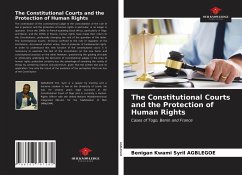The contribution of the constitutional judge to the consolidation of the rule of law in general, and the protection of human rights in particular, is no longer in question. Since the 1990s in French-speaking black Africa, particularly in Togo and Benin, and the 1970s in France, human rights have made their return to the Constitutions, profoundly changing the role of the guardian of the latter. The Constitutional Courts, formerly confined to the role of regulator of the Institutions, discovered another virtue, that of protector of fundamental rights. In order to understand this new function of the constitutional court, it is necessary to examine the text of the Constitution on the one hand, and constitutional practice on the other.However, questioning the guiding principle or philosophy underlying the decisions of constitutional judges in the area of human rights protection certainly has the advantage of revealing the reality of things by combining realism and positivism, given that the written text and its application "are only the result of the evolution of the perception that one has of the Constitution
The contribution of the constitutional judge to the consolidation of the rule of law in general, and the protection of human rights in particular, is no longer in question. Since the 1990s in French-speaking black Africa, particularly in Togo and Benin, and the 1970s in France, human rights have made their return to the Constitutions, profoundly changing the role of the guardian of the latter. The Constitutional Courts, formerly confined to the role of regulator of the Institutions, discovered another virtue, that of protector of fundamental rights. In order to understand this new function of the constitutional court, it is necessary to examine the text of the Constitution on the one hand, and constitutional practice on the other.However, questioning the guiding principle or philosophy underlying the decisions of constitutional judges in the area of human rights protection certainly has the advantage of revealing the reality of things by combining realism and positivism, given that the written text and its application "are only the result of the evolution of the perception that one has of the Constitution
The contribution of the constitutional judge to the consolidation of the rule of law in general, and the protection of human rights in particular, is no longer in question. Since the 1990s in French-speaking black Africa, particularly in Togo and Benin, and the 1970s in France, human rights have made their return to the Constitutions, profoundly changing the role of the guardian of the latter. The Constitutional Courts, formerly confined to the role of regulator of the Institutions, discovered another virtue, that of protector of fundamental rights. In order to understand this new function of the constitutional court, it is necessary to examine the text of the Constitution on the one hand, and constitutional practice on the other.However, questioning the guiding principle or philosophy underlying the decisions of constitutional judges in the area of human rights protection certainly has the advantage of revealing the reality of things by combining realism and positivism, given that the written text and its application "are only the result of the evolution of the perception that one has of the Constitution








